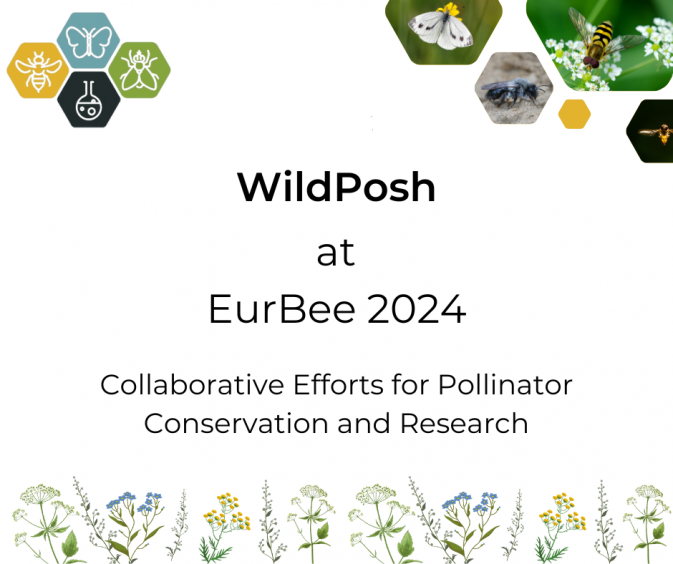WildPosh at EurBee 2024: Collaborative Efforts for Pollinator Conservation and Research

On 16-19 September 2024, the 10th Congress of Apidology (EurBee) was held in Tallinn, Estonia, organised by the Estonian University of Life Sciences. The event brought together over 350 visitors from 43 countries, from every continent except Antarctica to exchange the knowledge of novel scientific findings, associated with honeybees and other pollinators.
For young researchers, EurBee was a great opportunity to meet the leading scientists in their field, and establish new connections and networks, as this is extremely important for sustainable bee research. Among the visitors, there were people from the research community, industry, business partners, innovators, investors, international organisations, EU institutions, and national authorities.
EurBee was an important event for WildPosh as well, with many project partners participating in it to various extents.
One of our project partners Dr. Reet Karise (EMU), WP1 leader (A monitoring scheme to determine sources and routes of pesticide exposure in environmental compartments/matrices) was among the organisers, helping with preparing and distributing project materials, as well as sharing insights about the project.
Dr. Matti Leponiemi (RHUL), another project partner, was also present at the event. His goal was to reach out to fellow researchers and scientists and share early research outputs of WP1.
Prof. Simone Tosi (UNITO), WP5 leader (Integrated systems-based risk assessment), was one of the EurBee 2024 keynote speakers with a presentation on Bee health: the intricate impacts of pesticides.
In his talk, he drew on various studies to discuss the intricate relationship between bees and pesticides. He first highlighted the importance of biomonitoring studies using bees to reveal how multiple pesticides contaminated bees and the environment over time and space. Next, he delineated the broad range of side effects that pesticides caused to both managed and wild bees exposed to low, field-realistic levels. He detailed the variety of cognitive, behavioural, and physiological effects posed by individual or combined exposure to multiple stressors, such as malnutrition. He finally discussed the risk implications of current pesticide uses, further exploring the critical yet understudied process of pesticide "Emergency Authorisations." This commonly used process permitted the use of highly toxic pesticides regardless of risk assessment outcomes, raising concerns about the broad human, animal, and environmental implications and the enduring state of emergency that acted in derogation of the EU Regulation.
This overview aimed to enhance the understanding of bee health and facilitate the uptake of research into policies and practices, towards a greater sustainability of our society and the environment.
Prof. Pilar De la Rúa (UM), WP3 leader (Omics of pesticide responses in pollinators), was also one of the keynote speakers. The topic of her talk was Conservation Genetics of Bee Populations with a Focus on Honey Bees, Stingless Bees and Bumblebees.
In her presentation, she described how they had been using molecular tools to characterise bee populations in order to enhance conservation efforts. First, she presented their studies on honey bee populations in island ecosystems and examined the genetic consequences of introducing non-native subspecies. In addition, she discussed phylogeographic studies on stingless bees to understand how geography and management had influenced the population structure of these pollinators in Mesoamerican ecosystems. Finally, she addressed how commercial bumblebee management was altering the genetic diversity and structure of these vital crop pollinators in an important hotspot of bumblebee diversity, the Iberian Peninsula, which was also one of the areas with the most intensive use of managed bumblebees for pollination.
The primary objective of these conservation genetics studies was to use the acquired information to improve managed bee breeding programs and to enhance conservation efforts of locally adapted managed and wild bee populations in unique habitats.
She was also the first woman president of the European Association of Apidology (2012-2014) and the main organiser of the EURBEE6 congress held in Murcia in September 2014. Since 2021 she has been Director of the Office for the Transfer of Research Results at the University of Murcia.
If you are curious about the event, you can read more about it here.